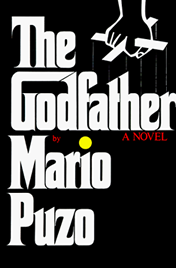
The Godfather is a crime novel by American author Mario Puzo. Originally published in 1969 by G. P. Putnam's Sons, the novel details the story of a fictional Mafia family in New York City, headed by Vito Corleone, the Godfather. The novel covers the years 1945 to 1955 and includes the back story of Vito Corleone from early childhood to adulthood.
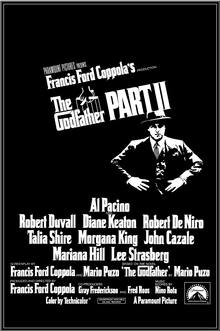
The Godfather Part II is a 1974 American epic crime film. The film is produced and directed by Francis Ford Coppola, loosely based on the 1969 novel The Godfather by Mario Puzo, who co-wrote the screenplay with Coppola. It is both a sequel and a prequel to the 1972 film The Godfather, presenting parallel dramas: one picks up the 1958 story of Michael Corleone, the new Don of the Corleone family, protecting the family business in the aftermath of an attempt on his life; the prequel covers the journey of his father, Vito Corleone, from his Sicilian childhood to the founding of his family enterprise in New York City. The ensemble cast also features Robert Duvall, Diane Keaton, Talia Shire, Morgana King, John Cazale, Mariana Hill, and Lee Strasberg.

The Godfather Part III is a 1990 American crime film produced and directed by Francis Ford Coppola from the screenplay co-written with Mario Puzo. The film stars Al Pacino, Diane Keaton, Talia Shire, Andy García, Eli Wallach, Joe Mantegna, Bridget Fonda, George Hamilton, and Sofia Coppola. It is the third and final installment in The Godfather trilogy. A sequel to The Godfather (1972) and The Godfather Part II (1974), it concludes the fictional story of Michael Corleone, the patriarch of the Corleone family who attempts to legitimize his criminal empire. The film also includes fictionalized accounts of two real-life events: the 1978 death of Pope John Paul I and the Papal banking scandal of 1981–1982, both linked to Michael Corleone's business affairs.

Michael Corleone is a fictional character and the protagonist of Mario Puzo's 1969 novel The Godfather. In the three Godfather films, directed by Francis Ford Coppola, Michael was portrayed by Al Pacino, for which he was twice-nominated for Academy Awards. Michael is the youngest son of Vito Corleone, a Sicilian immigrant who builds a Mafia empire. Upon his father's death, Michael succeeds him as the don of the Corleone crime family.

Vito Corleone is a fictional character in Mario Puzo's 1969 novel The Godfather and in the first two of Francis Ford Coppola's film trilogy. Vito is originally portrayed by Marlon Brando in the 1972 film The Godfather, and later by Oreste Baldini as a boy and by Robert De Niro as a young man in The Godfather Part II (1974). He is an orphaned Sicilian immigrant who builds a Mafia empire.
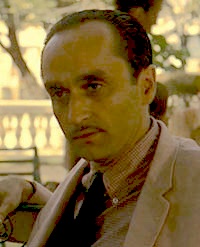
Frederico "Fredo" Corleone is a fictional character in Mario Puzo's 1969 novel The Godfather. Fredo is portrayed by American actor John Cazale in the Francis Ford Coppola 1972 film adaptation and in the 1974 sequel, The Godfather Part II.

Santino "Sonny" Corleone is a fictional character in Mario Puzo's 1969 novel The Godfather and its 1972 film adaptation.

Vincent SantinoCorleone is a fictional character in the 1990 feature film The Godfather Part III. He is portrayed by Andy García, who was nominated for an Academy Award for his performance.
The Corleone family are fictional characters in both the novels and the films created by Mario Puzo, first appearing in his 1969 novel, The Godfather. They are an organized crime family originating from the Sicilian town of Corleone, and based in New York City.

Thomas Hagen is a fictional character in Mario Puzo's 1969 novel The Godfather and Francis Ford Coppola's films The Godfather (1972) and The Godfather Part II (1974). He is portrayed by Robert Duvall in the films. He also appears in the Mark Winegardner sequel novels The Godfather Returns and The Godfather's Revenge, as well as Ed Falco's novel The Family Corleone. Duvall was nominated for an Academy Award for Best Supporting Actor and a BAFTA for his performance in the first film.
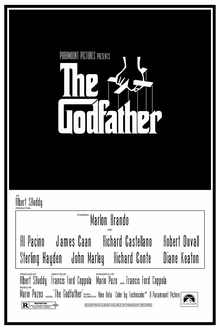
The Godfather is a 1972 American epic crime film directed by Francis Ford Coppola, who co-wrote the screenplay with Mario Puzo, based on Puzo's best-selling 1969 novel of the same title. The ensemble cast includes Marlon Brando, Al Pacino, James Caan, Richard Castellano, Robert Duvall, Sterling Hayden, John Marley, Richard Conte, and Diane Keaton. It is the first installment in The Godfather trilogy, chronicling the Corleone family under patriarch Vito Corleone (Brando) from 1945 to 1955. It focuses on the transformation of his youngest son, Michael Corleone (Pacino), from reluctant family outsider to ruthless mafia boss.

Peter Clemenza is a fictional character who first appeared in Mario Puzo's 1969 novel The Godfather. He is played by Academy Award-nominee Richard Castellano in Francis Ford Coppola's 1972 film adaptation of the novel, and by Bruno Kirby in The Godfather Part II (1974).
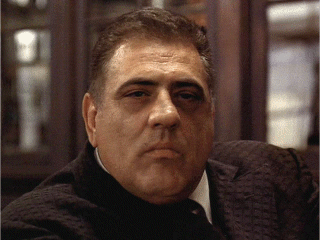
Luca Brasi is a fictional character in Mario Puzo's 1969 novel The Godfather, as well as its 1972 film adaptation. In the film, he was portrayed by Lenny Montana, an ex-wrestler and former bodyguard and enforcer for the Colombo crime family.

Hyman Roth is a fictional character and the main antagonist in the 1974 film The Godfather Part II. He is also a minor character in the 2004 novel The Godfather Returns. Roth is a Jewish mobster, investor and a business partner of Vito Corleone, and later his son Michael Corleone. He is based on notorious mobster and gambling kingpin Meyer Lansky. It was Al Pacino who suggested Lee Strasberg, his former acting teacher, for the role.
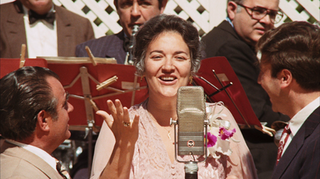
Carmela Corleone (1897–1959) is a fictional character in Mario Puzo's 1969 novel The Godfather. Carmela is portrayed by Italian-American Morgana King in Francis Ford Coppola's 1972 film adaptation of the novel, and in The Godfather Part II (1974). King also played Carmela Corleone in the 1977 television mini-series, The Godfather Saga.
Mafia films—a version of gangster films—are a subgenre of crime films dealing with organized crime, often specifically with Mafia organizations. Especially in early mob films, there is considerable overlap with film noir. Popular regional variations of the genre include Italian Poliziotteschi, Chinese Triad films, Japanese Yakuza films, and Indian Mumbai underworld films.

Carlo Rizzi is a fictional character in Mario Puzo's 1969 novel The Godfather. In the 1972 film adaptation, he was portrayed by Gianni Russo.
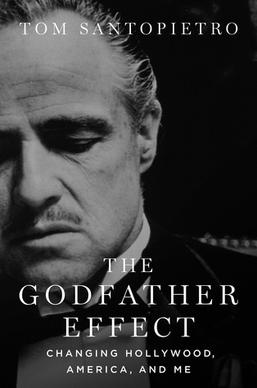
The Godfather Effect is a 2012 critically acclaimed study of The Godfather films – as well as Mario Puzo's 1969 novel – and their effect on American culture. Written by biographer Tom Santopietro, the book demonstrates how The Godfather was a turning point in American cultural consciousness. With its emphasis on proud ethnicity, The Godfather changed not just the way Italian-Americans saw themselves, but how Americans of all backgrounds viewed their individual and national self-identities, their possibilities, and attendant disappointments.
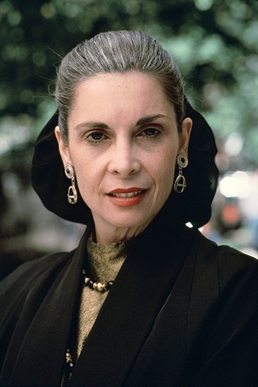
Constanzia "Connie" Corleone is a fictional character in The Godfather, a 1969 novel by Mario Puzo, and the 1972 film The Godfather. In the film, Connie is portrayed by Talia Shire, the sister of the director Francis Ford Coppola. Shire was nominated for the Academy Award for Best Supporting Actress for her portrayal of Connie Corleone in The Godfather Part II.

















